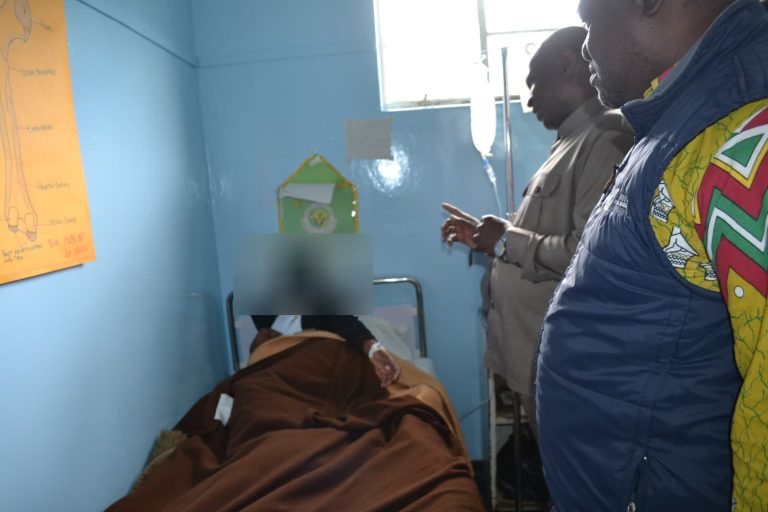Hazvinei Mwanaka
BIKITA, MASVINGO- “When you leave a seat, it will be wet, that makes you feel ashamed as people will start looking at you and asking so many questions making you feel ashamed, uncomfortable and this is very painful.”
These were the words of Elizabeth Dandauta, a lady from Gokwe who suffered obstetric fistula since 2011. She did not get any treatment since than and according to her it was due to lack of money and knowledge.
Obstetric fistula is a childbirth injury that occurs when complications during labor and delivery lead to a hole forming between the birth canal and the bladder or rectum. The injury results in uncontrollable leakage of urine or feaces.
Speaking during the commemorations of the International Day to End Obstetric Fistula at Mashoko Christian hospital in Bikita, Elizabeth said she was happy to get knowledge about the disease through the program.
“People with obstetric fistula feel ashamed to speak out and they do not want people to know their condition. For me, many people did not know that I lived with this condition.
“I tried to seek help but I had no money and resources to get the necessary help. Getting a job was difficult because you need to visit the toilet after every 30 minutes to change a pad or diaper, so I could not spend a day at work,” she said with watery eyes.
He husband dumped her because of the condition, leaving her to rely on family members and close relatives.
“They really played their part in trying to assist, some went as far as selling their livestock; 14 years is a very long time and it will come a time when they get tired and cannot sustain the demands of the condition,” added Elizabeth.
“I am very grateful for the people who came up with this program and would encourage the organizers to help as much people as possible as there are many people suffering silently. This condition does not discriminate, it cuts across all areas, urban or rural. They all need help,” she said.
Elizabeth thought she was alone to have such a ‘strange disease, but was ‘actually surprised to see a hospital ward full of woman with the same challenge.’
“I felt relieved knowing that I am not the only one with the condition,” she added.
In an interview with HuMFOZ, 38-year-old Smolly Mubaiwa from Guruve who is also receiving treatment at Mashoko Christian Hospital said she has endured the condition for the past ten years.
“It all started during my second pregnancy, I had labour pains around 5pm but I stayed far from the hospital and failed to get transport that day. The following morning, I went to the clinic and delivered my baby.
“When I was discharged I realized that my urine was leaking and could not control it. I later visited many doctors who advised me to visit specialists, but since I didn’t have money I just stayed home, until one day a fellow village health worker advised me to come to Mashoko Christian Hospital. That is how I found my way here,” said Smolly.
According to her, the condition is very painful and she could not tell her family members or anyone for fear of being stigmatized. Her husband went away leaving her to face the dilemma on her own.
“You just feel out of place, it is embarrassing to be honest, there is stigma, and other people think that you could have been bewitched because you took someone’s husband. The myths and misconceptions are so many.
“Now that I understand the condition, I am eager to offer counselling to some who are experiencing the same,” she said.
Elizabeth and Smolly are some of the women currently at fistula camp at Mashoko Christian Hospital where 45 women are expected to be treated free of charge.
Government and its development partners so far have capacitated six hospitals to conduct surgical repairs of obstetric fistula. These are namely Mashoko Christian Hospital, Chinhoyi Provincial Hospital, Mutambara Mission Hospital, Morgenster Mission Hospital, Chidamoyo Mission Hospital and the United Bulawayo Hospitals.
Guest of honour at the commemorations Deputy Minister of Health and Child Care, Sleiman Kwidini said the condition is not only a health crisis but a significant social challenge that impacts the lives of countless women and their families.
“In Zimbabwe, although we have not measured the magnitude of the fistula problem, we have repaired over 1800 women since 2015. Despite its devastating impact on the lives of girls and women, the prevention and treatment of obstetric fistula is still largely neglected in the developing world.
“In Zimbabwe we recognise that obstetric fistula is not merely a medical issue: it is a reflection of broader systematic challenges including inadequate access to quality maternal healthcare, poverty and educational disparities. It is unacceptable that in the 21st century, women are suffering from a condition that is entirely preventable,” he said.
He added that government is committed to tackling obstetric fistula through focused programming and collaboration with local and international partners.
Organisations such as Artemedis, the Fistula Foundation and the United Nations Population Fund (UNFPA) are working with government to provide surgical intervention.
Dr Peter Mukasa representing UNFPA said obstetric fistula is a preventable and treatable condition yet a number of women and girls are living with this devastating condition in Zimbabwe.
“It is against this background that the global campaign to End fistula was launched in 2003 by the UNFPA and partners. This campaign has helped catalyze progress towards eliminating fistula and supporting fistula survivors through its three-pronged strategy of prevention, treatment and social reintegration.
“Ending fistula cannot be viewed in isolation. It demands a comprehensive approach: investing in resilient health systems to strengthen maternal health services and safe and dignified child birth for every woman, and ensuring adequate funding for prevention and treatment, as well as socioeconomic reintegration of survivors,” he said.
Fistula Foundation programs director representing Atermedis Foundation Ms Bwalya Chomba said the International Day to End Obstetric Fistula is a special day for organisations in the fistula treatment community since it is an opportunity to commit themselves to do all they can to ensure that women with the condition receive high quality life-transforming care.
“Fistula Foundation focuses on delivering fistula and severe perennial tear surgery because of its enormous impact. With each surgery we provide, we know that we can help change one woman forever as we know that the effect of restored health for both their family and community is profound,” she said.
According to World Health Organisation, 50 000 to 100 000 women develop obstetric fistula each year worldwide.
This year’s commemorations ran under the theme; ‘Her Health, Her right: Shaping a Future Without Fistula.’
*Banner Image: Deputy Health and Childcare Minister Sleiman Kwidini talks to a patient who had undergone Obstetric Fistula repairs at Mashoko Christin Hospital recently

